
Processess used to operate on different types of material in the manufacturing industry are described.
- Subject:
- Engineering
- Manufacturing
- Material Type:
- Lecture Notes
- Author:
- Avinash Paruchuri
- Date Added:
- 02/16/2022

Processess used to operate on different types of material in the manufacturing industry are described.

This course introduces the programming, setup, and operation of CNC turning centers. Topics include programming formats, control functions, program editing, part production, and inspection. Upon completion, students should be able to manufacture simple parts using CNC turning centers.Resources include lectures, supplemental videos, and projects. This coruse was created using the Odigia platform.

This course provides an introduction to a variety of material-working processes that are common to the machining industry. Topics include safety, process-specific machining equipment, measurement devices, set-up and layout instruments, and common shop practices. Upon completion, students should be able to safely demonstrate basic machining operations, accurately measure components, and effectively use layout instruments.
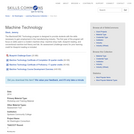
The Machinist/CNC Technology program is designed to provide students with the skills necessary to gain employment in the manufacturing industry. The first year of the program will focus on skills used in a modern machine shop: machine shop math, blueprint reading, and conventional machine tool theory and lab. An assessment (challenge exam) for prior learning credit for blueprint reading is included.
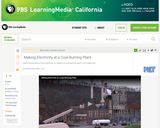
This video from KET traces the energy transformations that occur when coal is burned to produce electricity. Some of the mechanical processes are also described.
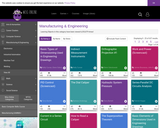
The Wisc-Online open educational resource library contains 25 free learning objects that can help you learn, study, or teach Manufacturing & Engineering - available to teachers and students under a Creative Commons license.
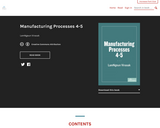
Short Description:
This textbook provides an introduction to the important area of manufacturing processes. This text will explain the hows, whys, and whens of various machining operations, set-ups, and procedures. Throughout this text, you will learn how machine tools operate, and when to use one particular machine instead of another. It is organized for students who plan to enter the manufacturing technology field and for those who wish to develop the skills, techniques, and knowledge essential for advancement in this occupational cluster. The organization and contents of this text focus primarily on theory and practice. Order a print copy: http://www.lulu.com/content/paperback-book/manufacturing-processes-4-5/24461389
Long Description:
This textbook provides an introduction to the important area of manufacturing processes. This text will explain the hows, whys, and whens of various machining operations, set-ups, and procedures. Throughout this text, you will learn how machine tools operate, and when to use one particular machine instead of another. It is organized for students who plan to enter the manufacturing technology field and for those who wish to develop the skills, techniques, and knowledge essential for advancement in this occupational cluster. The organization and contents of this text focus primarily on theory and practice.
Order a print copy: http://www.lulu.com/content/paperback-book/manufacturing-processes-4-5/24461389
Word Count: 48105
ISBN: 978-1-63635-048-6
(Note: This resource's metadata has been created automatically by reformatting and/or combining the information that the author initially provided as part of a bulk import process.)

Syllabus for Materials Science course that also uses:
Material Science FlexBook: https://flexbooks.ck12.org/user:bw9ycmlzdgvabglubmjlbnrvbi5lzhu./cbook/material-science/
NSF Materials Science and Technology module: http://matse1.matse.illinois.edu/metals/intro.html
NDT Resource Center: https://www.nde-ed.org/EducationResources/CommunityCollege/Materials/cc_mat_index.htm
Upon successful completion of this course, students will be able to:
Identify property classifications of various materials to determine their applicability for use.
Apply knowledge of subatomic, atomic, molecular, crystal and grain structures to materials science.
Identify materials commonly used in the manufacturing environment and safety/health issues.
Understand heat treating of ferrous metals and determine hardness.
Read and understand Safety Data Sheets (SDS).
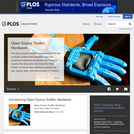
The Open Source movement revolutionized the way computer systems were developed and how companies made their businesses. Its philosophy requires that all source code should be freely shared, so that as many people as possible can use, change, learn, and improve upon it. In recent years the increasing availability and low costs of electronic components, processors and 3D printers meant that an open model of development has taken root also in the world of hardware, including the development of scientific lab equipment. The implications for research can hardly be overstated: Open Labware designs are almost always cheaper than closed source ones, allow for distributed development and, critically, customization by the end user, the lab scientist. PLOS welcomes submissions in this field.

Students will work through a manufacturing work flow simulation by making paper airplanes to meet a quota within a specific time frame.